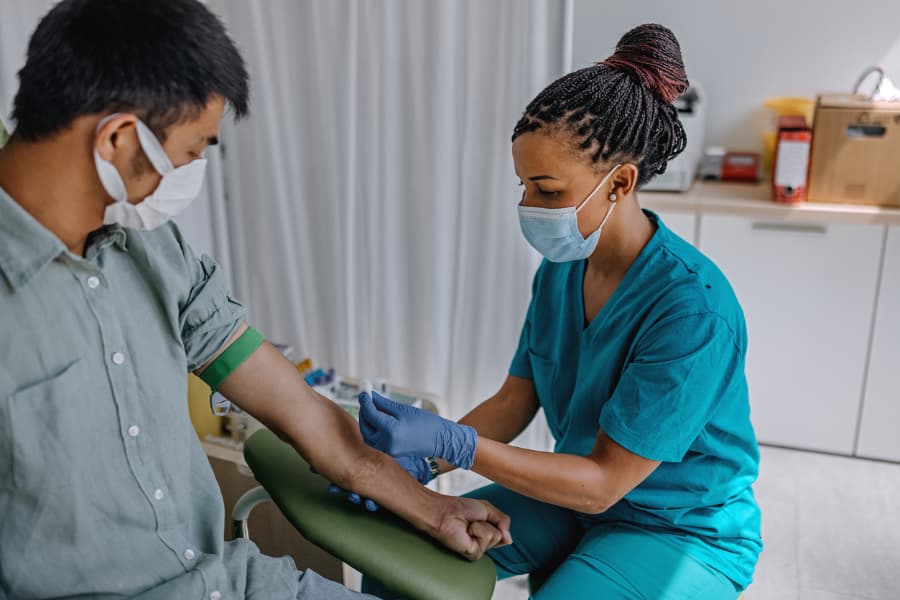 Blood tests are routinely used in healthcare to help diagnose illnesses, monitor chronic conditions, and test the effectiveness of medical treatments. Phlebotomy is the medical term for the process of drawing blood from a patient’s vein using a needle. The medical professionals who perform blood draws are known as phlebotomists or phlebotomy technicians. Some phlebotomists work at a hospital or medical office, but others travel to different sites.
Blood tests are routinely used in healthcare to help diagnose illnesses, monitor chronic conditions, and test the effectiveness of medical treatments. Phlebotomy is the medical term for the process of drawing blood from a patient’s vein using a needle. The medical professionals who perform blood draws are known as phlebotomists or phlebotomy technicians. Some phlebotomists work at a hospital or medical office, but others travel to different sites.
Phlebotomy training is included in the medical assistant program at Prism Career Institute’s campuses in Pennsylvania and New Jersey. Learn more about becoming a mobile phlebotomist.
What Does a Mobile Phlebotomist Do?
Mobile phlebotomists perform blood draws for laboratory testing and analysis. They may travel to patients’ homes, workplaces, or healthcare facilities. Their typical daily responsibilities might include:
- Traveling to various locations to meet with patients
- Setting up a mobile phlebotomy station, ensuring it is safe and sanitary
- Greeting patients, verifying their identities, and explaining the blood draw procedure
- Safely collecting and labeling blood samples
- Bandaging the patient’s arm after the blood draw is complete
- Transporting blood samples to a laboratory for analysis
- Appropriately handling medical waste, such as used needles
Mobile phlebotomists provide a crucial healthcare service, especially for patients who have difficulty traveling to a medical facility. For example, if an elderly patient needs routine blood work, a mobile phlebotomist may travel to the patient’s nursing home to collect samples.
In addition to their clinical duties, mobile phlebotomists also may have administrative tasks. They might be asked to organize or inventory lab equipment, as well as update patient records.
Where Do Mobile Phlebotomists Work?
Many different medical settings require phlebotomy services, from hospitals and surgery centers to laboratories and blood banks. Mobile phlebotomists work for a wide variety of healthcare providers, and they may travel to:
- Patients’ homes
- Nursing homes and assisted living facilities
- Rehabilitation centers
- Infusion centers
Some traveling phlebotomists also assist with blood donation collection at blood drives. Mobile phlebotomists may be employed by a health center, or they may work for a third-party contractor that provides mobile health services to a hospital or clinic.
Why Are Mobile Phlebotomists in Demand?
The U.S. Bureau of Labor Statistics (BLS) projects that employment of phlebotomists will grow by 8% over the decade, representing about 19,500 job openings each year, on average. In the United States, the growing population of older adults means an increased demand for medical services. Additionally, many insurance providers are prioritizing more home-based health services. This means there will be a growing need for mobile phlebotomists who can perform safe blood draws in settings that are convenient for patients.
Medical Assisting Training at Prism Career Institute
Many phlebotomists get their start by completing a medical assisting program. A medical assistant is a healthcare professional who helps clinics, medical offices, and hospitals run smoothly by performing a range of clinical and administrative tasks. Medical assistants work under the supervision of doctors and nurses.
At Prism Career Institute, students can complete the program in as little as 40 weeks. Prism Career Institute offers medical assistant programs at all three of our campuses, in Philadelphia, PA, and Cherry Hill and West Atlantic City, NJ.
This program includes phlebotomy training, as well as offsite externships where students can put their clinical skills into practice. Students are taught how to draw blood, safely handle blood specimens, and ensure patient hygiene and infection control. Through this medical assistant program, students can complete several of the classroom and clinical requirements needed for phlebotomy certification through organizations such as the National Healthcareer Association (NHA) and the National Phlebotomy Association (NPA). Plus, our dedicated career services department can help you explore phlebotomy career paths as you prepare to apply for your first job after graduation.
Note: Prism Career Institute does not offer a phlebotomy program. Training in this area is included as part of our medical assistant program.
Learn More About Careers in Healthcare
If you are passionate about helping others, consider a career in medical assisting. This field offers the flexibility to specialize in clinical roles, such as phlebotomy, or to focus more on the administrative side of healthcare. Medical assistants work in many different healthcare settings, including hospitals, clinics, and urgent care centers. Students at Prism Career Institute in Pennsylvania and New Jersey can benefit from practical, hands-on training that serves as a springboard into the world of medical assisting. Financial aid is available to students who qualify. To obtain more information about our programs or apply online, please contact us today.
